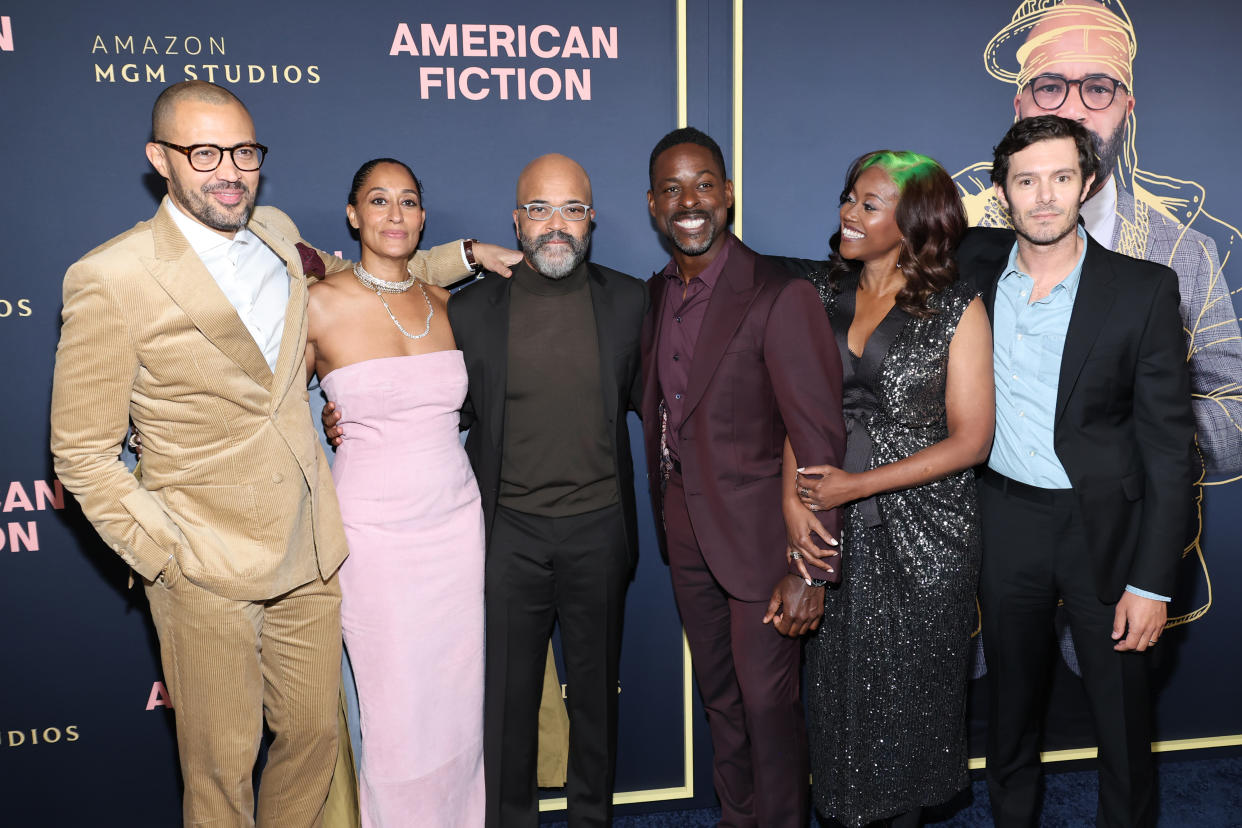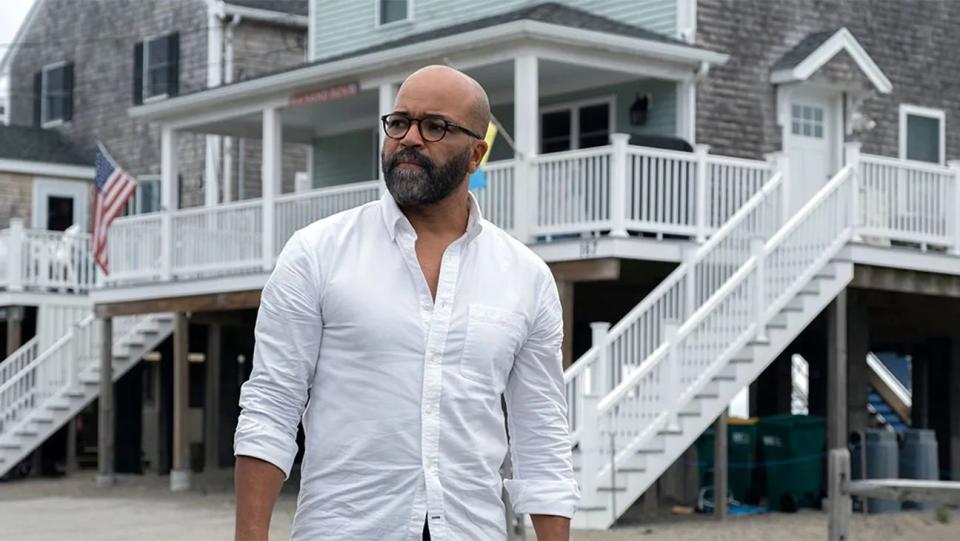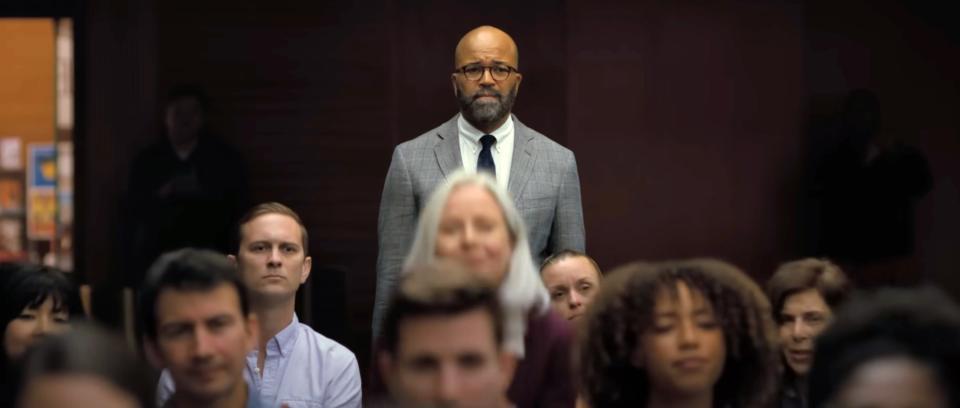Before ‘American Fiction,’ Star Jeffrey Wright Had Gotten Used to Playing Characters Very Different Than Him

- Oops!Something went wrong.Please try again later.
- Oops!Something went wrong.Please try again later.
- Oops!Something went wrong.Please try again later.
- Oops!Something went wrong.Please try again later.

Jeffrey Wright was in bed in Los Angeles when he got a text from producer Ben LeClair that some good news was coming his way. He woke up to find out that his new film “American Fiction,” adapted by TV writer-turned-director Cord Jefferson from the 2001 Percival Everett novel “Erasure,” had won the coveted People’s Choice Award at this year’s Toronto International Film Festival. That award almost always guarantees a Best Picture Oscar nomination.
And, sure enough, the dramedy, which follows the story of Thelonious “Monk” Ellison, an academic author on the margins who writes a rebellious piece of satire that becomes a runaway bestseller, is making its way in this year’s Oscar race. Since TIFF, it’s picked up more audience awards at the Mill Valley and Middleburg Film Festivals, plus Gotham and Indie Spirit nominations, an IndieWire Honor for Jefferson and a Palm Springs Achievement Award for Wright.
More from IndieWire
'Anatomy of a Fall' Wins Best Film at European Film Awards (Complete Winners List)
Paul Schrader Defends His Facebook Posting: It's a 'Very Efficient' Way to Criticize Films
As he bid farewell after four seasons to his recurring role in HBO’s “Westworld,” Wright was busy making movies. He joined Wes Anderson’s sprawling ensemble as General Gibson in “Asteroid City” (Focus), and took on New York powerbroker Adam Clayton Powell in biopic “Rustin” (Netflix), helmed by his go-to theater director George C. Wolfe (“Angels in America,” “Top Dog Underdog,” “Bring in ‘da Noise, Bring in ‘da Funk”).
When Jefferson — a journalist before he became a filmmaker — sent Wright the “American Fiction” script, the actor had already admired some of Jefferson’s articles. “It was clear from the script,” he said over Zoom, “that he was a writer of wit and wisdom and had on the page a wonderful handle on story. And although he hadn’t directed before, he clearly understood the narrative architecture in a way that was fresh and thoughtful.”
But Wright never got around to finishing “Erasure,” the daring satire on which “American Fiction” is based, until after shooting was over. “I realized that Cord had reshaped it in his own image,” he said. “Even some of the catalyzing moments, he had recrafted. The script, which I read first, struck me on a most personal level. It was almost as though the book of my life was the critical thing to read.”
The movie is also a heart-tugging family drama; Monk is pulled back into his family when he loses his older sister (Tracee Ellis Ross) and has to care for his dementia-ridden mother (Leslie Uggams). When he first read the script, Wright had recently lost the mother who had raised him in Washington, D.C. “I understood the ways in which the responsibilities and the pressures that come along with suddenly becoming caretaker to those who have been caretaker to you,” he said, “change in radical ways the direction of a life, both personal and professional. And that’s the driving thread of this film. It’s not the social commentary and the satire, which is wonderful, but for me, the core of it is the story of a man and his relationship to his family. In some ways, that’s the most radical aspect of the film.”
That’s because the depiction of a family like this in movies is unusual. “We rarely see a family that’s as authentically mad, and loving, and dysfunctional,” said Wright. “And at the same time a family that also happens to be Black. I’ve never in my career played these notes. I’ve never had the opportunity to live inside that in a film or show before. But, again, those things had become so critical and so central to my life, that it was gratifying to me to inhabit that space. I was raised by two women, my mother and her elder sister, my aunt. And so, my mother was a huge presence. She was absolutely the fulcrum and epicenter of our family. And then she wasn’t. It took a lot to wrestle with that and fill in this chasm.”
Only once before had Wright played a character that felt so close to him, even if he was an only child who had only dreamed of having an older sister like Tracee Ellis Ross. “This character, and also, Basquiat, probably are the two most personal,” he said. “With Monk, there wasn’t a lot that I had to transform in body and voice. What I most appreciated about the character, because of who he was, how he was raised, how he was educated, and what his profession was, was his relationship to language. Which is something that I’m always drawn to, and when it’s available in characters, a character in which language is functional for communication, and also as a weapon: those are always fun tools to have in the hip pocket.”

The other character who drew on Wright’s own experience was the title role in “Basquiat” (1996). “He was a very specific personality,” said Wright. “I connected with his journey through the Lower East Side of Manhattan as a young creative trying to navigate his way through this unwelcoming world that his art led him to, and the ways in which he tried to exercise his authentic voice. That was the journey of the young Black creative. I was living that life, when I first came here. I wasn’t nearly as successful as he, but I understood something about that journey. And I also felt that his historical and social touchstones were also often mine and this reservoir that he pulled from in his work were ones that resonated with me as well: superheroes like Miles Davis and Muhammad Ali, the undiscovered genius of the Mississippi Delta, the language of the blues. It’s about this creative mind wrestling with the expectations and the presumptions about what he should be, trying, sometimes successfully, sometimes not, to maintain authenticity. Succeeding, but also failing.”
In “American Fiction,” Monk rebelliously and hilariously creates a satiric street story that he assumes no one will take seriously. Instead, it’s a popular sensation that instantly sells to the lit world and Hollywood. His financial woes are over. “It’s his expression of moral outrage and literary rage,” said Wright. “He’s not a perfect hero here. There’s a certain degree of arrogance, a dismissiveness within him.”
Monk is often in trouble with the people around him for this reason. “There’s a detachment, definitely an inability to play the game and a social awkwardness,” said Wright, “that further fuels the frustration that leads him to the point of creating this fictional monster that circles back around to him.”
And then Monk has to play the monster. “The one thing that I tried to insist upon was that Monk is a good, interesting writer, but not the greatest actor,” said Wright. “I thought that made a bit of fun. He’s doing the best he can.”
From the beginning of the shoot last fall in Boston, Wright sensed that “American Fiction” would turn out well. Part of it was the way the crew behaved. “The crew is the first audience,” he said. “And the crew tells you if you’re doing something that might be special, because you can just observe an increase in the level of pride in what they are doing on a day to day basis. And when you see them working for 17 hours or whatever with an extra attention to detail and a brighter spring in the step because they’re really digging what’s happening, you know that you’re onto something. “There’s ‘quiet on the set,'” as is the cliche, but there’s an extra degree of quiet that happens. And you go, ‘Oh, OK. We’re touching something.'”

Four seasons on “Westworld” honed his skills, he said. “I used to be an athlete. My strength was in my flexibility. When the camera is on you and everybody’s put in all the work that’s required to set up that frame, then, you have to breathe and do your thing. Nobody wants to be on a film set all day long dragging ass. Crews appreciate sharp and efficient work. On ‘Westworld’ we would shoot the equivalent of five movies in six or seven months at a super high quality. So it honed my abilities to be efficient. And move that ball down the field.”
For a long time, Wright didn’t think he was going to be able to play Adam Clayton Powell, but a visit to his mother’s house convinced him. “He was part political shaman, part showman,” Wright said. “He was a character, but he had more power than any other Black man in the political sphere for many years. And he was also extremely charismatic and well-loved among my mother’s generation. She marched in the March on Washington. George was insistent that I play this role. And I know how meticulous a caretaker and shepherd George is of this history, and certainly of a man like Bayard Rustin, who stood on the barricade that provided freedoms to all of us, but in ways that have been underappreciated. So George was on me to do this role.”
When Wright entered the house, the contents of the basement had been brought up to the living room. He walked in and Adam Clayton Powell was pointing at him from an album of his speeches called “Keep the Faith Baby”: “I called George, and he said, ‘That’s your mother telling you to do my movie, Jeffrey.’ And I said, ‘OK.'”
Next up: Matt Reeves is writing “The Batman: Part Two.” “The intent certainly is to revisit Gotham,” he said. “But when exactly, has not been etched in stone.”
MGM and Amazon Studios release “American Fiction” in limited theaters on Friday, December 15, with expansion to follow.
Best of IndieWire
2023 Emmy Predictions: Who Will Win at the Primetime Emmy Awards?
2023 Emmy Predictions: Outstanding Documentary or Nonfiction Special
2023 Emmy Predictions: Outstanding Documentary or Nonfiction Series
Sign up for Indiewire's Newsletter. For the latest news, follow us on Facebook, Twitter, and Instagram.

